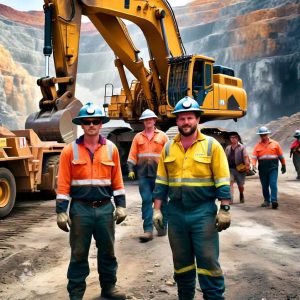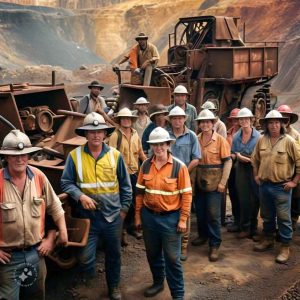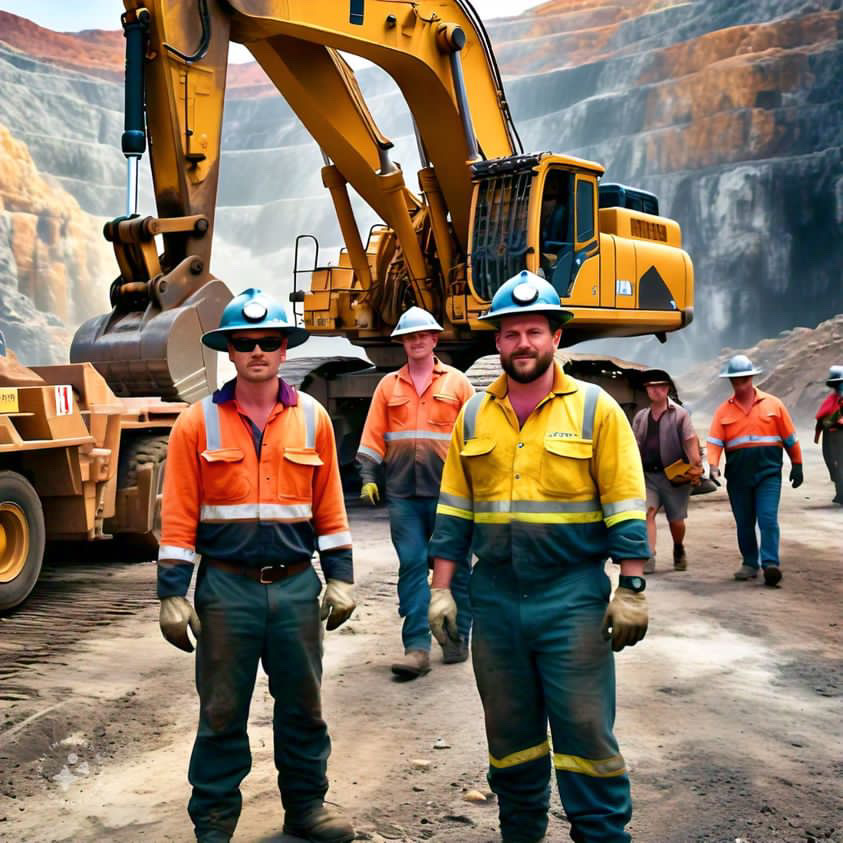
Australia is renowned for its vast mineral resources, making it a global leader in the mining industry. The country’s mining sector plays a crucial role in its economy, contributing significantly to national revenue and employment. As the demand for minerals continues to rise, the mining industry in Australia is constantly seeking skilled workers across various roles. This article explores the landscape of mining jobs in Australia, the types of roles available, skills required, and tips for securing a position in this lucrative industry.
The Importance of the Mining Industry in Australia
Australia is rich in natural resources, with abundant deposits of coal, iron ore, gold, copper, and lithium, among others. The mining industry is a cornerstone of the Australian economy, contributing around 10% to the country’s GDP and generating substantial export revenues. The sector provides thousands of jobs, not just in mining operations but also in related fields such as engineering, environmental science, and logistics.
The mining industry is also crucial for Australia’s energy production, particularly through coal and natural gas. Additionally, as the world shifts toward renewable energy sources, there is a growing demand for minerals used in technologies such as batteries and solar panels, further enhancing job prospects in the sector.
Types of Mining Jobs Available
The mining industry offers a diverse range of job opportunities across various fields. Here are some of the most common types of mining jobs available in Australia:
1. Field and Operations Roles
•Mining Engineers: Responsible for designing and implementing mining operations, mining engineers assess site feasibility, develop mine plans, and ensure safety and environmental compliance. A degree in mining engineering or a related field is typically required.
•Geologists: Geologists study the earth’s materials and help locate and evaluate mineral deposits. They conduct field surveys and analyses to assess the viability of mining projects. A background in geology or earth sciences is essential for this role.
•Operators: Equipment operators are crucial in mining operations, as they operate heavy machinery such as excavators, bulldozers, and haul trucks. Training and certification are usually required for these positions.
•Drillers and Blasters: These professionals are responsible for drilling holes in rock formations for explosives or mineral extraction. They must understand geological conditions and safety protocols.
2. Support and Technical Roles
•Environmental Scientists: As mining can have significant environmental impacts, environmental scientists are needed to assess and mitigate these effects. They work on compliance with environmental regulations and sustainability initiatives.
•Surveyors: Surveyors measure and map the land, helping to define mine boundaries and assist in planning. A degree in surveying or a related field is necessary for this role.
•Health and Safety Officers: Safety is paramount in the mining industry. Health and safety officers develop and implement safety policies, conduct training, and ensure compliance with regulations.
3. Logistics and Administration
•Supply Chain Managers: These professionals oversee the procurement and distribution of materials and equipment needed for mining operations. Strong organizational and management skills are required.
•Human Resources Managers: HR managers in the mining sector focus on recruitment, training, and employee relations, ensuring that the workforce is skilled and motivated.
•Finance and Accounting: Financial analysts and accountants help manage budgets, financial reporting, and compliance, playing a critical role in the profitability of mining operations.

Skills Required for Mining Jobs
To succeed in the mining industry, candidates need a combination of technical skills, soft skills, and specific qualifications. Here are some essential skills:
1. Technical Proficiency
•Specialized Knowledge: Many roles in mining require specific technical knowledge, whether it be in geology, engineering, or environmental science. Advanced education and training in these fields are often necessary.
•Equipment Operation: For operational roles, candidates must be skilled in operating heavy machinery and understanding maintenance protocols.
2. Safety Awareness
•Risk Management: Mining is inherently risky, so candidates must be well-versed in safety regulations and practices. Safety training and certifications are critical for most roles.
•Attention to Detail: The ability to recognize potential hazards and adhere to safety protocols is essential in preventing accidents and ensuring the well-being of all personnel.
3. Soft Skills
•Communication: Strong communication skills are vital for working effectively in teams, reporting findings, and interacting with various stakeholders, including management and regulatory bodies.
•Problem-Solving: The ability to analyze situations and develop effective solutions is crucial, particularly in dynamic and challenging environments.
4. Adaptability and Resilience
The mining industry often involves working in remote locations and harsh conditions. Candidates must be adaptable and resilient, able to handle challenges and work under pressure.
Securing a Mining Job in Australia
Getting a job in the mining industry can be competitive, but with the right approach, candidates can enhance their chances of success. Here are some tips for securing a mining job in Australia:
1. Networking
Building connections in the industry can significantly increase job opportunities. Attend industry events, join professional organizations, and connect with professionals on platforms like LinkedIn to expand your network.
2. Gain Relevant Experience
Experience is invaluable in the mining sector. Consider internships, apprenticeships, or entry-level positions to gain hands-on experience. Even volunteering for related projects can be beneficial.
3. Tailor Your Resume and Cover Letter
When applying for jobs, tailor your resume and cover letter to highlight relevant skills and experiences. Emphasize any specific qualifications, certifications, or training that align with the job requirements.
4. Stay Informed About the Industry
Keeping up with industry trends, news, and developments can help you understand the job market better. This knowledge can be advantageous during interviews and networking conversations.
5. Consider Remote Work Options
Many mining jobs are located in remote areas. Being open to relocation or working in remote settings can increase your job prospects, as many companies look for candidates willing to work on-site.
The Future of Mining Jobs in Australia
As Australia continues to expand its mining capabilities, the future of mining jobs looks promising. The demand for critical minerals, particularly those needed for renewable energy technologies, is expected to grow. This shift will likely lead to the creation of new roles and opportunities in the sector.
Moreover, advancements in technology, such as automation and data analytics, are changing the landscape of mining jobs. While some traditional roles may evolve, new opportunities will arise in areas like robotics, artificial intelligence, and environmental sustainability.
Conclusion
Mining jobs in Australia offer diverse opportunities for individuals seeking rewarding careers in a vital industry. With its significant contributions to the economy, job security, and various career paths, the mining sector remains an attractive option for job seekers. By gaining relevant skills, networking, and staying informed about industry trends, aspiring professionals can position themselves for success in this dynamic field. Whether you’re starting your career or looking to advance, the mining industry has much to offer for those willing to embrace the challenge.
Warning: Undefined variable $post in /home/landingp/public_html/wp-content/themes/newses/inc/ansar/hooks/hook-single-page.php on line 180
